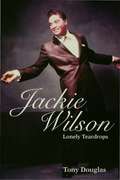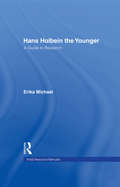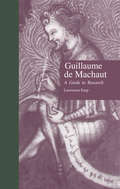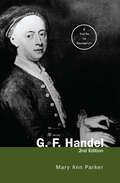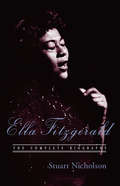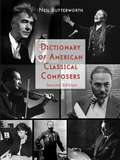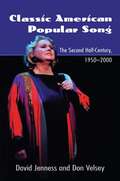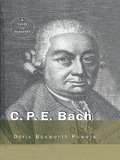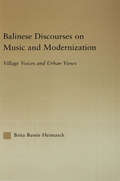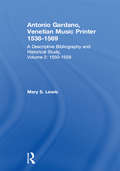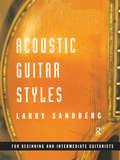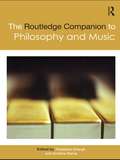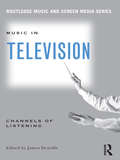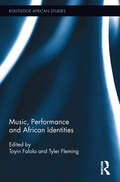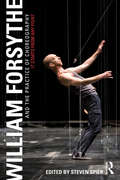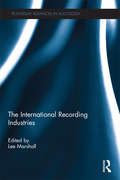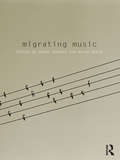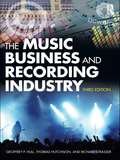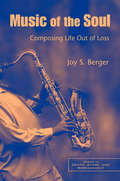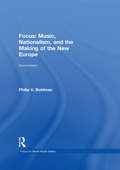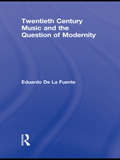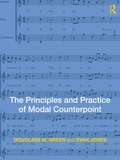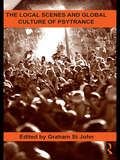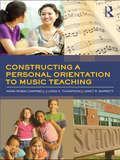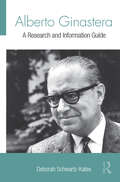- Table View
- List View
Jackie Wilson: Lonely Teardrops
by Tony DouglasTo his many fans, he was known simply as "Mr. Excitement," a singer whose music and stage presence influenced generations of performers, from Elvis Presley to Michael Jackson. Jackie Wilson: Lonely Teardrops looks at the life and career of this deeply troubled artist. Published briefly in a limited edition in the United Kingdom, this Routledge edit
Hans Holbein the Younger: A Guide to Research (Artists Resource Manuals Ser. #Vol. 2)
by Erika MichaelIn this quincentennial year of Holbein's birth, this is the first comprehensive annotated bibliography of texts relating to this important Northern European Renaissance artist, with an accompanying historiographic essay on various aspects of Holbein's reception.The first part of the book, "Some Notes on Reception," contains overviews of texts about
Guillaume de Machaut: A Guide to Research (Composer Resource Manuals Ser. #Vol. 36.)
by Lawrence EarpThis book provides an overview of the current state of research on Machaut, the major figure of 14th-century French music and poetry, giving fair representation to the many areas of Machaut research that are pursued in fields outside music.Coverage of the current state of knowledge on each of the manuscripts includes the newly discovered Aberystwyth manuscript, described in detail here for the first time. A section on the large narrative poems pulls together recent research of several scholars and offers new views. An up-to-date concordance of the miniatures in all of the illustrated Machaut manuscripts gives information on where published studies and facsimiles may be found. The discography is the most complete list of Machaut recordings yet compiled and provides critical evaluations of recordings most valuable for instruction, according to our latest conception of performance practice in the 14th-century.A biography section organizes the documentary material in a way that will facilitate further research. The bibliography of secondary works cites books, editions, articles, and dissertations (including forthcoming works) from 1740 to 1991, in French, English, the other western European languages, Polish, Russian, and Japanese. The volume is fully indexed.
G. F. Handel: A Guide to Research (Routledge Music Bibliographies)
by Mary Ann ParkerFirst Published in 2005. Routledge is an imprint of Taylor & Francis, an informa company.
Ella Fitzgerald: A Biography of the First Lady of Jazz, Updated Edition
by Stuart NicholsonStuart Nicholson's biography of Ella Fitzgerald is considered a classic in jazz literature. Drawing on original documents, interviews, and new information, Nicholson draws a complete picture of Fitzgerald's professional and personal life. Fitzgerald rose from being a pop singer with chart-novelty hits in the late '30s to become a bandleader and then one of the greatest interpreters of American popular song. Along with Billie Holiday, she virtually defined the female voice in jazz, and countless others followed in her wake and acknowledged her enormous influence. Also includes two 8-page inserts.
Dictionary of American Classical Composers
by Neil ButterworthThe Dictionary of American Classical Composers covers over 650 composers active from the 18th century to today. Covering all classical styles, it offers the most comprehensive overview of key composers in the United States available.Entries include basic biographical information and critical analysis of each composer's key works and ideas. Entries also include worklists and bibliographic information. Whenever possible, the entries will have been checked by the composers themselves to assure greatest possible accuracy. This new edition, completely updated and expanded from the 1984 edition, also includes over 200 historic photographs.
Classic American Popular Song: The Second Half-Century, 1950-2000
by David Jenness Donald VelseyFirst Published in 2006. Routledge is an imprint of Taylor & Francis, an informa company.
C.P.E. Bach: A Guide to Research (Routledge Music Bibliographies)
by Doris PowersAlthough he is the son of J. S. Bach, C. P. E. Bach is an important composer in his own right, this long-awaited annotated bibliography presents a complete listing of the works of C. P. E. Bach. This volume in the Routledge Music Bibliographies series includes many different aspects of his work: the editing of his father's masterpieces, his concert
Balinese Discourses on Music and Modernization: Village Voices and Urban Views (Current Research In Ethnomusicology: Outstanding Dissertations Ser. #Vol. 5)
by Brita Heimarck ReneeWhile many Western scholars have discussed the technical aspects of Balinese music or the traditional contexts for performance, little has been written in Western languages about Balinese discourses on their music. This dissertation seeks to understand the experience of music in Bali according to Balinese voices through an analysis of oral and written dialogues on music, mainly by musicians and dalangs (shadow play puppeteers) from the village of Sukawati, scholars, teachers, administrators and students from the Indonesian College of the Arts (STSI) in the City of Denpasar. The study examines the influence of modernization on the traditional arts and their role in society. A concentration on Balinese discourses enables individual performers and scholars to represent themselves to a greater extent than previously seen in ethnomusicological scholarship, making this study more of a critical discussion among equals than a Western interpretation of 'others'. This approach permits a rare view into contemporary Balinese conceptions and practices of music.
Antonio Gardano, Venetian Music Printer, 1538-1569: A Descriptive Bibliography and Historical Study, 1550-1559 (Music Reference Ser. #Vol. 2)
by Mary LewisAntonio Gardano's publications are among the most important sources of 16th-century music. The second volume describes the output of this leading Italian music press in its cultural, bibliographical, and musical context. The first part of the book consists of an overview of Gardano's repertory from the fifties and the cultural and musical milieu in which he worked. It includes discussions of the continuing popularity of his earlier repertory, the music of the younger generation introduced in the fifties, the music of the composers around San Marco, and genres such as the multi-movement madrigal, the canzoni villanesche, instrumental works, and new anthologies. Also discussed are the dating of some undated editions, unconfirmed and doubtful prints, and ordering within the editions. A chapter on binder's copies describes groups of editions bound together by their early owners and serves as a valuable index to the tastes of the collectors. The catalog section covers all Gardano's known publications of the fifties, and provides full titles, bibliographical information, contents with concordant sources for each piece, and locations of individual copies with notes on their bindings, owners' marks, annotations, and other significant characteristics. The catalog is indexed by composer, first line, and short title, and includes a list of primary and secondary sources consulted.
Acoustic Guitar Styles
by Larry Sandberg"Acoustic Guitar Styles" introduces the most popular traditional styles for the acoustic guitar. The step-by-step approach, using a small repertoire of well-known songs, enables the student to explore various styles that can be adapted to play personal favorites. Although a basic knowledge of the guitar is assumed, even the beginner will benefit from this progressive approach.
The Routledge Companion to Philosophy and Music (Routledge Philosophy Companions)
by Theodore Gracyk Andrew KaniaThe Routledge Companion to Philosophy and Music is an outstanding guide and reference source to the key topics, subjects, thinkers and debates in philosophy and music. Over fifty entries by an international team of contributors are organised into six clear sections: general issues emotion history figures kinds of music music, philosophy and related disciplines The Routledge Companion to Philosophy and Music is essential reading for anyone interested in philosophy, music and musicology.
Music in Television: Channels of Listening
by James DeavilleMusic in Television is a collection of essays examining television’s production of meaning through music in terms of historical contexts, institutional frameworks, broadcast practices, technologies, and aesthetics. It presents the reader with overviews of major genres and issues, as well as specific case studies of important television programs and events. With contributions from a wide range of scholars, the essays range from historical-analytical surveys of TV sound and genre designations to studies of the music in individual programs, including South Park and Dr. Who.
Music, Performance and African Identities (Routledge African Studies)
by Toyin Falola Tyler FlemingCutting across countries, genres, and time periods, this volume explores topics ranging from hip hop’s influence on Maasai identity in current day Tanzania to jazz in Bulawayo during the interwar years, using music to tell a larger story about the cultures and societies of Africa.
William Forsythe and the Practice of Choreography: It Starts From Any Point
by Steven SpierWilliam Forsythe’s reinvigoration of classical ballet during his 20-year tenure at the Ballett Frankfurt saw him lauded as one of the greatest choreographers of the postwar era. His current work with The Forsythe Company has gone even further to challenge and investigate fundamental assumptions about choreography itself. William Forsythe and the Practice of Choreography presents a diverse range of critical writings on his work, with illuminating analysis of his practice from an interdisciplinary perspective. The book also contains insightful working testaments from Forsythe’s collaborators, as well as a contribution from the choreographer himself. With essays covering all aspects of Forsythe’s past and current work, readers are provided with an unparalleled view into the creative world of this visionary artist, as well as a comprehensive resource for students, scholars, and practitioners of ballet and contemporary dance today.
The International Recording Industries (Routledge Advances in Sociology)
by Lee MarshallThe recording industry has been a major focus of interest for cultural commentators throughout the twenty-first century. As the first major content industry to have its production and distribution patterns radically disturbed by the internet, the recording industry’s content, attitudes and practices have regularly been under the microscope. Much of this discussion, however, is dominated by US and UK perspectives and assumes the ‘the recording industry’ to be a relatively static, homogeneous, entity. This book attempts to offer a broader, less Anglocentric and more dynamic understanding of the recording industry. It starting premise is the idea that the recording industry is not one thing but is, rather, a series of recording industries, locally organised and locally focused, both structured by and structuring the international industry. Seven detailed case studies of different national recording industries illustrate this fact, each of them specifically chosen to provide a distinctive insight into the workings of the recording industry. The expert contributions to this book provide the reader with a sense of the history, structure and contemporary dynamics of the recording industry in these specific territories, and counteract the Anglo-American bias of coverage of the music industry. The International Recording Industries will be valuable to students and scholars of sociology, cultural studies, media studies, cultural economics and popular music studies.
Migrating Music (CRESC)
by Jason Toynbee Byron DueckMigrating Music considers the issues around music and cosmopolitanism in new ways. Whilst much of the existing literature on ‘world music’ questions the apparently world-disclosing nature of this genre – but says relatively little about migration and mobility – diaspora studies have much to say about the latter, yet little about the significance of music. In this context, this book affirms the centrality of music as a mode of translation and cosmopolitan mediation, whilst also pointing out the complexity of the processes at stake within it. Migrating music, it argues, represents perhaps the most salient mode of performance of otherness to mutual others, and as such its significance in socio-cultural change rivals – and even exceeds – literature, film, and other language and image-based cultural forms. This book will serve as a valuable reference tool for undergraduate and postgraduate students with research interests in cultural studies, sociology of culture, music, globalization, migration, and human geography.
The Music Business and Recording Industry
by Richard Strasser Thomas Hutchison Geoffrey P HullThe Music Business and Recording Industry is a comprehensive music business textbook focused on the three income streams in the music industry: music publishing, live entertainment, and recordings. The book provides a sound foundation for understanding key issues, while presenting the latest research in the field. It covers the changes in the industry brought about by the digital age, such as changing methods of distributing and accessing music and new approaches in marketing with the Internet and mobile applications. New developments in copyright law are also examined, along with the global and regional differences in the music business.
Music of the Soul: Composing Life Out of Loss (Series in Death, Dying, and Bereavement)
by Joy S. BergerMusic of the Soul guides the reader through principles, techniques, and exercises for incorporating music into grief counseling, with the end goal of further empowering the grieving person. Music has a unique ability to elicit a whole range of powerful emotional responses in people - even so far as altering or enhancing one's mood - as well as physical reactions. This interdisciplinary text draws in equal parts from contemporary grief/loss theory, music therapy research, historical examples of powerful music, case studies, and both self-reflecting and teaching exercises. Music is as much about beginnings as endings, and thus the book moves through life’s losses into its new beginnings, using musical expression to help the bereaved find meaning in loss and hurt, and move forward with their lives. With numerous exercises and examples for implementing the use of music in grief counseling, the book offers a practical and flexible approach to a broad spectrum of mental health practitioners, from thanatologists to hospice staff, at all levels of professional training and settings.
Focus: Music, Nationalism, and the Making of the New Europe (Focus on World Music Series)
by Philip V. BohlmanTwo decades after the fall of communism in Eastern Europe and one decade into the twenty-first century, European music remains one of the most powerful forces for shaping nationalism. Using intensive fieldwork throughout Europe -- from participation in alpine foot pilgrimages to studies of the grandest music spectacle anywhere in the world, the Eurovision Song Contest -- Philip V. Bohlman reveals the ways in which music and nationalism intersect in the shaping of the New Europe. Focus: Music, Nationalism, and the Making of the New Europe begins with the emergence of the European nation-state in the Middle Ages and extends across long periods during which Europe’s nations used music to compete for land and language, and to expand the colonial reach of Europe to the entire world. Bohlman contrasts the "national" and the "nationalist" in music, examining the ways in which their impact on society can be positive and negative -- beneficial for European cultural policy and dangerous in times when many European borders are more fragile than ever. The New Europe of the twenty-first century is more varied, more complex, and more politically volatile than ever, and its music resonates fully with these transformations.
Twentieth Century Music and the Question of Modernity (Routledge Advances in Sociology)
by Eduardo de la FuenteIn the first decade of the twentieth-century, many composers rejected the principles of tonality and regular beat. This signaled a dramatic challenge to the rationalist and linear conceptions of music that had existed in the West since the Renaissance. The ‘break with tonality’, Neo-Classicism, serialism, chance, minimalism and the return of the ‘sacred’ in music, are explored in this book for what they tell us about the condition of modernity. Modernity is here treated as a complex social and cultural formation, in which mythology, narrative, and the desire for ‘re-enchantment’ have not completely disappeared. Through an analysis of Schoenberg, Stravinsky, Boulez and Cage, 'the author shows that the twentieth century composer often adopted an artistic personality akin to Max Weber’s religious types of the prophet and priest, ascetic and mystic. Twentieth Century Music and the Question of Modernity advances a cultural sociology of modernity and shows that twentieth century musical culture often involved the adoption of ‘apocalyptic’ temporal narratives, a commitment to ‘musical revolution’, a desire to explore the limits of noise and sound, and, finally, redemption through the rediscovery of tonality. This book is essential reading for those interested in cultural sociology, sociological theory, music history, and modernity/modernism studies.
The Principles and Practice of Modal Counterpoint
by Douglass Green Evan JonesCovering modal music from Gregorian chant through the seventeenth-century, The Principles and Practice of Modal Counterpoint is a comprehensive textbook combining stylistic composition, theory and analysis, music history, and performance. By supplementing a modified species approach with a wealth of complete musical examples and historical information, this textbook thoroughly joins principle with practice, providing a truly immersive experience in the study of modal counterpoint and familiarizing students with modal repertoire.
The Local Scenes and Global Culture of Psytrance (Routledge Studies In Ethnomusicology Ser. #2)
by Graham St JohnThis lively textual symposium offers a collection of formative research on the culture of global psytrance (psychedelic trance). As the first book to address the diverse transnationalism of this contemporary electronic dance music phenomenon, the collection hosts interdisciplinary research addressing psytrance as a product of intersecting local and global trajectories. Contributing to theories of globalization, postmodernism, counterculture, youth subcultures, neotribes, the carnivalesque, music scenes and technologies, dance ritual and spirituality, chapters introduce psytrance in Goa, the UK, Israel, Japan, the US, Italy, Czech Republic, Portugal and Australia. As a global occurrence indebted to 1960s psychedelia, sharing music production technologies and DJ techniques with electronic dance music scenes, and harnessing the communication capabilities of the Internet, psytrance and its cultural implications are thoroughly discussed in this first scholarly volume of its kind.
Constructing a Personal Orientation to Music Teaching
by Mark Robin Campbell Linda K Thompson Janet R. BarrettConstructing a Personal Orientation to Music Teaching promotes inquiry and reflection to facilitate teacher growth, lifelong learning and a disposition toward educational change. Strongly grounded in current theories and research in teacher education, the text engages readers in analyzing their own experiences in order to conceptualize the complexity of teaching; involves them in clarifying their reasons for seeking a career in teaching; supports their insights, questions, and reflections about their work; and promotes a reflective, critical attitude about schools in general as teachers are urged to think of themselves as change agents in school settings.
Alberto Ginastera: A Research and Information Guide (Routledge Music Bibliographies)
by Deborah Schwartz-KatesAlberto Ginastera: A Research and Information Guide is the first bio-bibliographic study of the composer and the only published book on the subject in English. This work fills a critical gap in contemporary music studies by enriching our knowledge of one of the most compelling creative voices of the Americas. Given the lack of prior systematic attention to Ginastera, this book establishes a firm foundation for future scholarship. It includes a detailed biographical sketch of the composer that quotes extensively from his letters. It summarizes the defining features of his style and encompasses his infrequently explored late works. It offers the most comprehensive catalogue of Ginastera’s music to date and provides an annotated list of his published writings. This book contains over 400 annotated bibliographic entries that refer to critically selected sources in English, Spanish, French, German, and Italian. The last chapter offers new information about archival holdings and internet resources that facilitates research on this composer. An appendix featuring a detailed chronology of Ginastera’s career completes this work.
